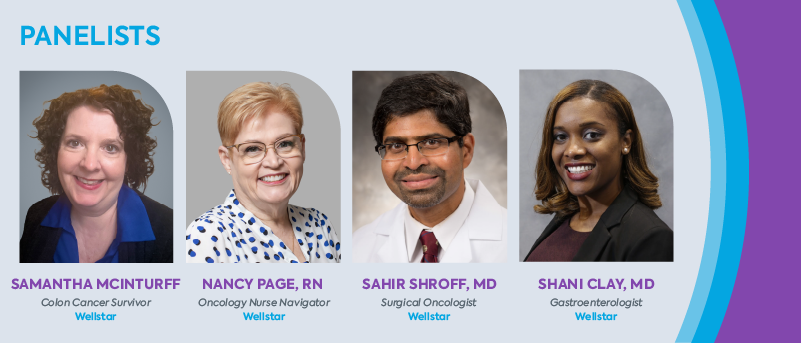In people under 50, colorectal cancer is now the number one cancer-related killer of men and the number two killer of women. Black communities are 20% more likely to get colorectal cancer and 40% more likely to die from it. But this doesn’t have to be the case—colorectal cancer is preventable. When people have a screening colonoscopy, doctors can remove pre-cancerous polyps, stopping them from ever becoming cancer.
Colonoscopies are now recommended starting at age 45 for the general population, and younger for people at higher risk or with a family history. But you have questions:
I’m above average healthy—do I really need a colonoscopy?
How do I know my risk level?
Will the procedure be painful?
How much time should I take off of work?
A panel of gastrointestinal health experts and a patient answer your questions and more here.

Who needs a colonoscopy
I eat well, exercise and am in good general health. Do I really need to go through the hassle of a screening colonoscopy?
Dr. Shani Clay, gastroenterologist: Unfortunately, we discover colon cancer in quite healthy individuals. While it is true that smoking and consumption of red meat increases your risk, we also see colorectal cancer in patients who follow very healthy diets and exercise regularly, hence the need for all people to get screened for colon cancer.
Samantha McInturff, colon cancer survivor: The screening age used to be 50 before they changed it to 45, so I had never had a screening. I was 48 when I had symptoms that led to a colonoscopy and I was diagnosed with stage 4 colon cancer. I am a rule follower. I always get my mammograms. I never smoked. I have no family history. I thought, ‘How can I have cancer?’ What I’ve been through really highlights the importance of screening early. Don’t be scared. Getting screened for colon cancer is a small inconvenience that’s completely worth it.
When should I start having colon cancer screenings and how often will I need to have one?
Dr. Clay: For people at average risk, meaning people with no alarm symptoms and no family history of colon cancer, screening begins at age 45.
How frequently you should have a colonoscopy depends on a few things, including family history, the number and type of polyps that are found during your colonoscopy and how clean the colon is at the time of the procedure. Repeat procedures can be anywhere from six months up to 10 years, depending on the results.
Colon cancer is in my family. When should I start screening?
Dr. Sahir Shroff, surgical oncologist: We’re seeing more and more young patients with colon cancer. If a patient has a strong family history, the screening should start sooner than 45 years of age. For example, if your parent died of colon cancer, you should begin colonoscopies at the age of 30. It depends on the risk factor. Talk to your primary care doctor about your personal risk level.
Dr. Clay: If you have high-risk factors, you should be screened earlier. For example, if a person has a first-degree relative with colon cancer who was diagnosed at less than 60 years of age, that individual should get a screening colonoscopy at either 40 years of age or 10 years younger than the age at the relative’s diagnosis. Additionally, there are certain genetic syndromes that also warrant earlier colon cancer screening with a colonoscopy at less than 45 years of age. Wellstar has a Genetic Risk Assessment Program for people with hereditary risk factors or a family history of cancer.
Should I see a doctor if my stool looks different than before?
Nancy Page, oncology nurse navigator: If you’re having changes in your bowel habits like blood in or on your stool or black stool, you need to let your doctor know soon. Consistent changes like constipation, diarrhea and, it may sound gross, but skinny stools that look like a pencil for a few weeks or more are signs to talk to your doctor. Other changes to be aware of are unexplained weight loss, unexplained fatigue, abdominal pain and even anemia. Don’t put it off. Don’t think, ‘I work a lot. I have kids. I’m busy.’ Let your doctor know now. If it’s colon cancer and it’s diagnosed early, there’s a 90% cure rate.




